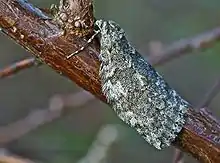November moth
The November moth (Epirrita dilutata) is a moth of the family Geometridae. The species was first described by Michael Denis and Ignaz Schiffermüller in 1775. It can be found in the Palearctic realm in western Europe from central Scandinavia to the Mediterranean the Caucasus and western Russia.
| November moth | |
|---|---|
 | |
| Scientific classification | |
| Kingdom: | Animalia |
| Phylum: | Arthropoda |
| Class: | Insecta |
| Order: | Lepidoptera |
| Family: | Geometridae |
| Genus: | Epirrita |
| Species: | E. dilutata |
| Binomial name | |
| Epirrita dilutata (Denis & Schiffermüller, 1775) | |
The wingspan is 38–44 mm, the forewings being variably marked with alternating pale and dark bands. The forewing ground colour is pale with darker grey and tinted brown. It has wavy lines. The hindwing is white grey with two lines. The distal fascia points in to the discal spot. Melanism is common and in some locations all-dark individuals make up the majority of the population. The species is extremely similar to two of its relatives, the pale November moth and autumnal moth, and they cannot usually be separated without examination of the genitalia. The November moth flies at night from September to November and is attracted to light and sometimes to nectar-rich flowers.
The caterpillar is green with red markings and feeds on a wide range of trees and shrubs. The species overwinters as an egg.
Recorded food plants
Notes
- ^ The flight season refers to the British Isles. This may vary in other parts of the range.
References
- Chinery, Michael Collins Guide to the Insects of Britain and Western Europe 1986 (Reprinted 1991)
- Skinner, Bernard Colour Identification Guide to the Moths of the British Isles 1984
External links
| Wikimedia Commons has media related to Epirrita dilutata. |
- November moth at UKMoths
- Fauna Europaea
- Lepidoptera of Belgium
- Lepiforum e.V.
- De Vlinderstichting (in Dutch)